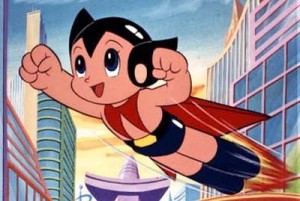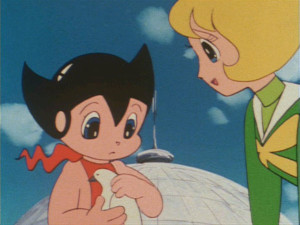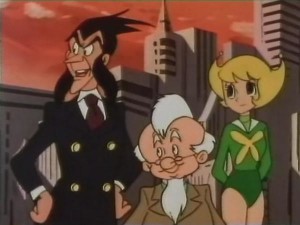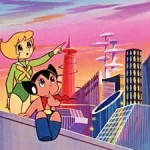Jetter Mars (Anime)
Also known as ジェッターマルス (Jettā Marusu)
Originally conceived as a remake or sequel to Tezuka’s earlier Astro Boy (1963-66) animated television series, Jetter Mars (1977) was broadcast on the Fuji Television Network from February 3 to September 15, 1977, for a total of 27 episodes.
What it’s about
In the year 2015, Dr. Yamanoue, the Minister of Science, is dedicated to building the world’s strongest robot. Despite being built in the image of a young boy, Dr Yamanoue plans for the robot to become a powerful warrior to be used to protect Japan. However, even though physically the robot is nearly perfect, its artificial intelligence has a major design flaw. Unable to fix this flaw, Dr. Yamanoue asks his long-time friend, Dr. Kawashimo, to correct the robot’s artificial intelligence for him. Dr. Kawashimo agrees and is able to successfully correct the problem.
Dr. Kawashimo, accompanied by his robot daughter Miri, visit the Ministry of Science to watch the birth of the new robot – which Dr. Yamnoue names Jetter Mars, after the Roman God of War
After his birth, Mars has difficulty understanding the difference between right and wrong. Exacerbating the situation, Dr. Yamanoue and Dr. Kawashimo are often at odds over how Mars should be raised. On the one hand, Dr. Kawashimo believes that Mars should learn compassion because, in his opinion, having a heart is just as important for robots as it is for humans. On the other hand, Dr. Yamanoue believes that robots are only really useful if they are used for military purposes.
Throughout the series, Mars faces a variety of situations and, with the help of his school-mates and friends, comes to learns about the importance of compassion and empathy.
What you should know
Although many consider Jetter Mars (1977) simply a rip-off of Astro Boy (1963-66), the story is much more complicated.
In the late 1970s Tezuka, wanting to continue working in animation, took a job as a director at the Toei Animation studio. He originally proposed a series called Mighty Mars as a remake and/or sequel to the 1960s version of Astro Boy (1963-66). Toei Animation liked the idea and saw it as a series commemorating Tezuka’s 30th anniversary in the business – beginning with his manga, New Treasure Island (1947). However, since Mushi Productions had declared bankruptcy in 1973 and the rights of Astro Boy (1963-66) went to their sponsor company, Meiji Seika Kaisha, Ltd. an official remake could not be made under these circumstances.
As such, primarily to distance it from any potential copyright issues with Meiji Seika Kaisha Ltd., the title of the anime was changed from Mighty Mars to Jetter Mars and the main theme of the show ended up showcasing Jetter Mars’ personal growth and moral development instead of Astro Boy’s struggle to create a world where robots and humans could live peacefully together. However, some notable similarities that remained between the two series. Mari Shimizu, the original voice actress for Astro Boy, voiced Jetter Mars, and Hisashi Katsuta (Dr. Ochanomizu) was hired to voice Dr. Kawashimo. Also Mars’ character design in general is a nod to Astro Boy.
Despite Tezuka’s involvement in the series’ in its early development, Tezuka was not involved in directing the episodes of the series itself. Toei Animation collaborated with Madhouse and Jetter Mars (1977) is a co-production. As a result, the show was worked on by many of Mushi’s ex-production staff, who used to work for Tezuka. Akio Sugino was the animation and character design supervisor, and he assisted the Toei Animators in designing the characters to fit Tezuka’s style. Rintaro was hired as the chief director of Jetter Mars (1977), becoming the first anime that Toei hired him to direct. The relationship between Rintaro and Toei would lead him to direct other anime such as Space Pirate Captain Harlock (1978) and the Galaxy Express 999 films.
Although still considered a mild success, the public had a relatively cool reception to the redesign and wanted the same Astro Boy as in the 1960’s. That and the combination of micro-managing at Toei Animation led Tezuka to lose interest and abandon the project after only 27 episodes. A few years later, after regaining copyrights on all his characters, he decided to revisit Astro Boy (1980-81) – this time in colour again with no compromises. The Tezuka Productions series was a hit, lasting a full two seasons for a total of 52 episodes.
Mars has also made an animated appearance in The Last Mystery of the 20th Century and a cameo appearance in the Game Boy Advance Game, Astro Boy: The Omega Factor. The Jetter Mars DVD box set was released on March 2009 by Avex in Japan.






